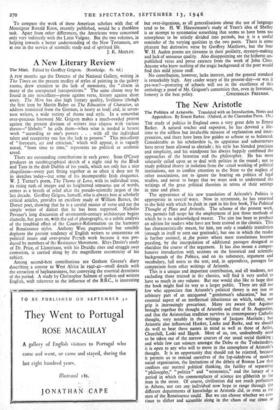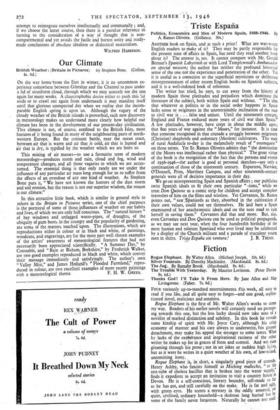The New Aristotle
Tim study of politics in England owes a very great debt to Ernest Barker. A natural teacher and expositor, he has devoted a life- time to the selfless but invaluable mission of explanation and inter- pretation, and there have been few guides so urbane or so balanced. Considerable as his scholarship is, its apparatus and substructure have never been allowed to obtrude ; his style has blended precision and simplicity, and his standpoint has always happily combined the approaches of the historian and the philosopher. He has most salutarily called upon us to deal with politics in the round ; not to study political theory in isolation front the actual working of political institutions, not to confine attention to the State to the neglect of other associations, not to ignore the bearing' on politics of legal studies, and never to forget that we must seek to understand the writings of the great political theorists in terms of their settings in time and place.
The appearance of his new translation of Aristotle's Politics is appropriate in several! ways. Now in retirement, he has returned to the field with which he dealt in 1906 in his first book, The Political " Thought of Plato and Aristotle. The scheme of the present work, too, permits full scope for the employment of just those methods of which he is an acknowledged master. The aim has been to produce an edition for readers who have not been trained in the classics. This has characteristically meant, for him, not only a readable translation (enough in itself to earn our gratitude), but one in which the reader is further assisted, at the points where most translations become puzzling, by the interpolation of additional passages designed to elucidate the course of the argument. It has also meant a compre- hensive introduction with sections on the historical and scientific backgrounds of the Politics, and on its substance, argument and vocabulary, full notes to the text, and, in appendices, passages for comparison from other writings of Aristotle.
This is a unique and important contribution, and all students, not excluding those trained in the classics, will find it very useful to have so much in one volume. But one would also like to hope that the book might find its way to a larger public. There are still too few who appreciate that Aristotle's political theory is not just an arbitrary part of an antiquated " gentleman's education," but an essential aspect of an intellectual inheritance on which, today, our grip is increasingly precarious. Many are aware that Aquinas brought together the thought of Aristotle and that of St. Augustine, and that the Aristotelian tradition survives in contemporary Catholic thought, very notably in the writings of Jacques Maritain ; but Aristotle also influenced Hooker, Locke and Burke, and we should do well to bear these names in mind as well as those of Attlee, Churchill, Laski -and Hayek. Most of us, too, undoubtedly need to be taken out of the narrow courses of our usual social thinking ; and while few can sojourn amongst the Dobu or the Trobrianders, it is open to any who will to move in the atmosphere of Aristotle's thought. It is an opportunity that should nol be rejected, because it permits us to remind ourselves of the lop-sidedress of modern social organisation, the limitations of the debris of Roman Law that confines our normal political thinking, the futility of separating " philosophy," " politics " and "economics,4 and the lunacy of a period in which the commonplaces of science are gibberish to the man in the street. Of course, civilisation did not reach perfection in Athens, nor can any individual now hope to range through the different departments of knowledge as Aristotle did, or even as the men of the Renaissance could. But we can choose whether we con- tinue to slither and scramble along in the• chaos of our times or
attempt to reintegrate ourselves intellectually and communally ; and, if we choose the latter course, then there is a peculiar relevance iii turning to the consideration of a way of thought that is non- compartmental and yet avoids the facile and barren unity and ready- made conclusions of absolute idealism or dialectical materialism.
WILFRID HARRISON.



























 Previous page
Previous page